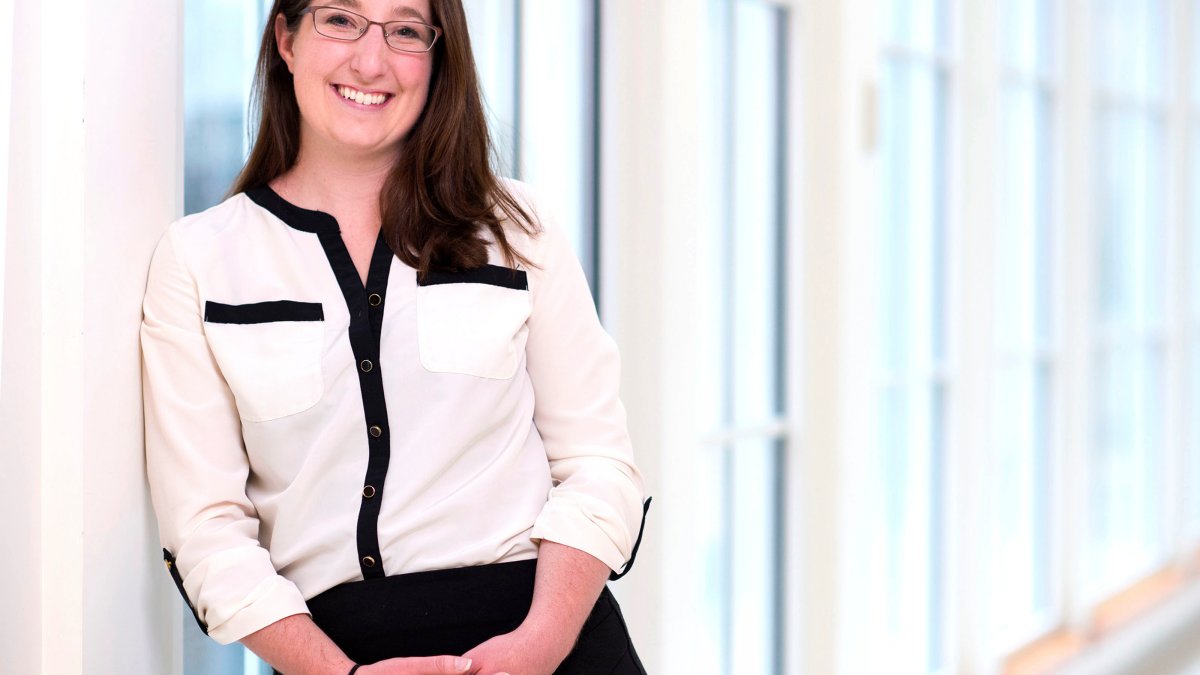Engineering a better future
Ashley Johnson’s desire to benefit society led her to the University of North Carolina at Chapel Hill to work on rapid 3-D printing methods in the DeSimone Research Lab.

Ashley Johnson has always wanted to help people.
At first she thought social work would be her avenue to achieving that goal. Then anthropology was a consideration.
Ultimately, she landed on science.
“I came to see science as a really powerful tool to help society,” she said. “I wanted to do something that I knew could change the direction of something that was happening in society. Research is a great way to do that because it really matters what decisions you make and where your research goes. You have a lot of power to use technology to better society.”
Johnson’s desire to benefit society led her to the University of North Carolina at Chapel Hill to work on rapid 3-D printing methods in the DeSimone Research Lab. Five years later, Johnson will be receiving her doctorate in biomedical engineering at the Graduate School’s annual Hooding Ceremony on May 7 at the Dean E. Smith Center.
The Dallas native has already accepted a senior scientist position in Merck’s exploratory products and technology group in Landsdale, Pennsylvania, where she will continue to work on a topic she spent most her career at Carolina focusing on: the use of 3-D printing in the pharmaceutical industry.
Johnson became interested in the global health aspects of biomedical engineering as an undergraduate at Washington University in St. Louis where she joined a group called “Engineering World Health.” The group of engineering students focused on creating sustainable medical devices for the developing world. During Johnson’s time with the group, the students developed a new packaging system to efficiently transport HIV medication to Third World countries before the drugs went bad.
Johnson then spent a summer at the Massachusetts Institute of Technology working in a lab creating technologies to benefit the same developing countries.
“I struggled for a really long time,” Johnson said. “I had this major, but I didn’t really know how to use it in a way that was beneficial to society. Through those two different programs, I could see how I could actually be helpful.”
When deciding on a graduate program to continue her research, working in Joseph DeSimone’s lab was a major draw. The lab, she said, offered the ability to work toward real world solutions.
“I came in seeing his lab as a place where you’re working on relevant questions and really disruptive technologies more so than something that’s just an incremental improvement,” she said.
At Carolina, Johnson worked closely with her mentor’s startup company Carbon, which innovated 3-D printing by evolving it from a layer-by-layer approach to using a controlled combination of light and oxygen to continuously fuse objects together from a pool of liquid resin.
Johnson looked to build on the capability of the new the Continuous Liquid Interface Production technique used in Carbon’s printers and began improving the ability to print very small parts, such as microneedles.
“They’re these tiny devices — you can think of it almost as a sticker — that has little needles on the other side,” Johnson said. “The needles are so short that you can’t feel them when you press it into the skin. So it’s pain free. You can essentially push these tiny needles into your skin and they just dissolve and release medication in your body.”
The product being developed, which is created by mixing a drug with the polymer used by the printer, may have an impact in both first and third world nations.
Typically, vaccines must stay refrigerated to remain stable. When distributing the vaccine in countries with remote or undeveloped regions, that can be a struggle. Microneedles can be a solution because they don’t need to be refrigerated.
“Sometimes, when you deliver some sort of vaccine to a foreign country it will become inactive by the time the person gets it, which means it’s not working,” Johnson said. “Microneedles are a way to improve distribution.”
As for their application in developed countries, the microneedles may be used by diabetics in lieu of insulin shots. This aspect of her work earned Johnson a Graduate Education Advancement Board Impact Award this year for contributing to a better future for people and communities in North Carolina.
“I’m very aware that I’m one ant in this army,” she said. “There are so many people that have come before me and will come after me, and I’m just glad to have had the opportunity to play a part in the scientific community and to be able to contribute to that.”
As she becomes a senior scientist working for one of largest pharmaceutical companies in the world, Johnson hopes to use her abilities to develop technologies to change the world.
And at the core of her work will be her desire to help people.
“For me, I just wouldn’t want to work on anything else,” Johnson said. “Despite how difficult it is, I really love doing what I’m doing.”




